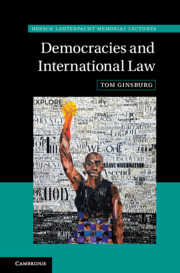Book contents
- Democracies and International Law
- Recent books in the Hersch Lauterpacht Memorial Lecture Series
- Democracies and International Law
- Copyright page
- Dedication
- Frontispiece
- Contents
- Figures
- Tables
- Preface
- Acknowledgments
- Introduction
- 1 Why Would Democracies Be Different?
- 2 Are Democracies Different?
- 3 Can International Law Save Democracy?
- 4 Regions and the Defense of Democracy
- 5 Authoritarian International Law
- 6 Whence the Liberal Order?
- Conclusion
- Index
3 - Can International Law Save Democracy?
Published online by Cambridge University Press: 09 September 2021
- Democracies and International Law
- Recent books in the Hersch Lauterpacht Memorial Lecture Series
- Democracies and International Law
- Copyright page
- Dedication
- Frontispiece
- Contents
- Figures
- Tables
- Preface
- Acknowledgments
- Introduction
- 1 Why Would Democracies Be Different?
- 2 Are Democracies Different?
- 3 Can International Law Save Democracy?
- 4 Regions and the Defense of Democracy
- 5 Authoritarian International Law
- 6 Whence the Liberal Order?
- Conclusion
- Index
Summary
International law can facilitate democratic governance by preserving the norms of reciprocity that make democracy work. It can do so by articulating norms and standards, facilitating the creation of public goods, supporting domestic institutional structures, coordinating reputational sanctions and, on occasion, legitimating external intervention. These tools are limited but can function when political incentives are aligned.
Keywords
- Type
- Chapter
- Information
- Democracies and International Law , pp. 103 - 123Publisher: Cambridge University PressPrint publication year: 2021

